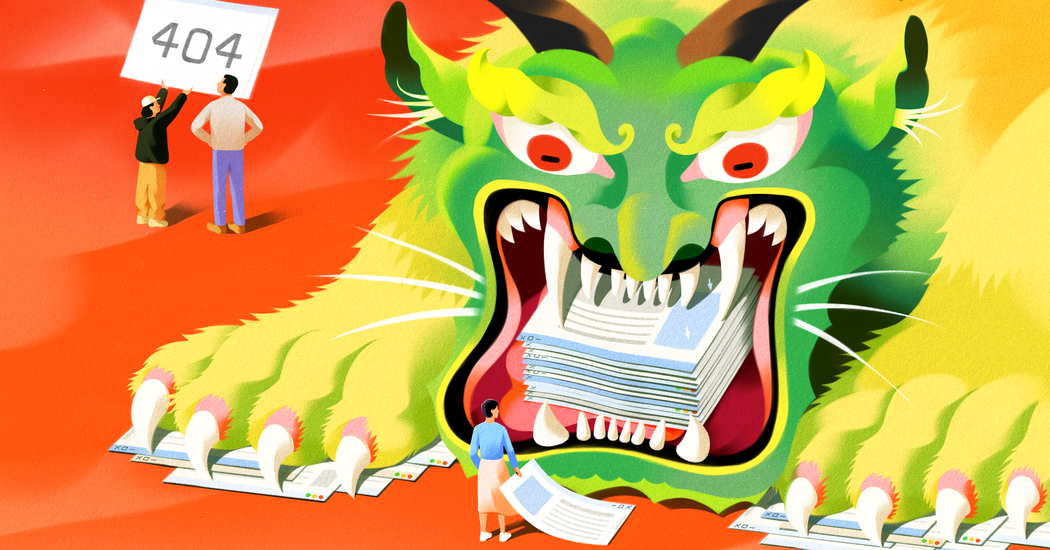The number of Chinese websites is shrinking and posts are being removed and censored, stoking fears about what happens when history is erased.
Chinese people know their country’s internet is different. There is no Google, YouTube, Facebook or Twitter. They use euphemisms online to communicate the things they are not supposed to mention. When their posts and accounts are censored, they accept it with resignation.
They live in a parallel online universe. They know it and even joke about it.
Now they are discovering that, beneath a facade bustling with short videos, livestreaming and e-commerce, their internet — and collective online memory — is disappearing in chunks.
A post on WeChat on May 22 that was widely shared reported that nearly all information posted on Chinese news portals, blogs, forums, social media sites between 1995 and 2005 was no longer available.
“The Chinese internet is collapsing at an accelerating pace,” the headline said. Predictably, the post itself was soon censored.
Welcome to the Great Leap Forward 2.0
This is a drop in the ocean compared to the centuries of lost physical artefacts and writings.
Some Chinese 80’s and 90’s kids are going to be ecstatic to find this out
This is the best summary I could come up with:
Now they are discovering that, beneath a facade bustling with short videos, livestreaming and e-commerce, their internet — and collective online memory — is disappearing in chunks.
I also searched for Liu Chuanzhi, known as the godfather of Chinese entrepreneurs: He made headlines when his company, Lenovo, acquired IBM’s personal computer business in 2005.
Internet publishers, especially news portals and social media platforms, have faced heightened pressure to censor as the country has made an authoritarian and nationalistic turn under Mr. Xi’s leadership.
“Even though we tend to think of the internet as somewhat superficial,” said Ian Johnson, a longtime China correspondent and author, “without many of these sites and things, we lose parts of our collective memory.”
In “Sparks,” a book by Mr. Johnson about brave historians in China who work underground, he cited the Internet Archive for Chinese online sources in the endnotes because, he said, he knew they would all eventually disappear.
Mr. Johnson founded the China Unofficial Archives website, which seeks to preserve blogs, movies and documents outside the Chinese internet.
The original article contains 1,267 words, the summary contains 175 words. Saved 86%. I’m a bot and I’m open source!
Reddit’s really no different in that regard.
Thank Dog for the Lemmyverse.
deleted by creator
A lot was lost, stories, history and even people. Fuck China indeed, but this is still a tragedy.
They don’t have Google in China at all?
I’m pretty sure this is happening in the US because of those pages no longer being profitable to run.
There’s a big difference between that and losing chunks of the internet because of rampant censorship, something we aren’t experiencing in the West/US.
Yeah, and there’s people trying to save as much as possible. Unfortunately attrition of history is nothing new.
I’ve got dead links/ bookmarks to pages from the hill, Wall Street journal, the guardian, and several other still functioning websites where information has been selectively censored or removed. And is not specifically an age thing, I have some bookmarks that are older than the dead links that are still functional on those same websites
The massive difference is that even if that’s true, it’d be on the corporations deciding to change narrative independently, not being forced to by the government.
Outlets like the Guardian are certainly willing to piss off the U.S. government, they were literally one of the publishers of the Snowden files.
The difference is only in the actor behind it - in China, it’s an authoritarian government. In the US, the government is just a figurehead for the wealthy elite.
In the US, the government is just a figurehead for the wealthy elite.
Odd that the country supposedly being ran by a figurehead for wealthy elites is infinitely better to live in for working class people, than the supposedly completely working class inspired “socialist” country.
You never found it weird that the Chinese government cracks down harder on independent trade unionists than actual capitalists do here?






